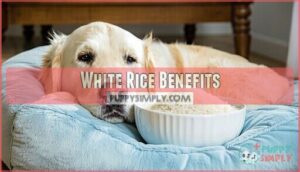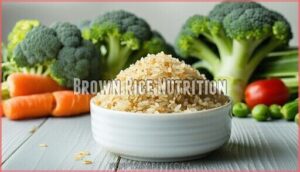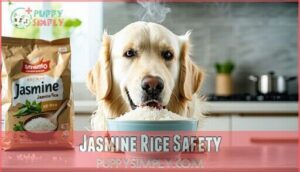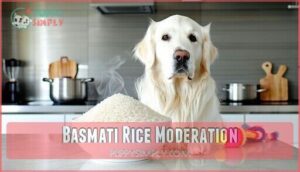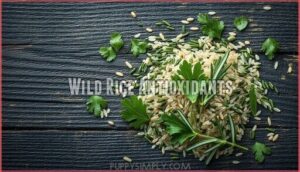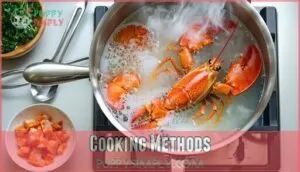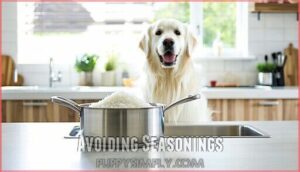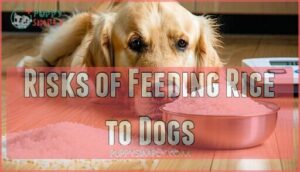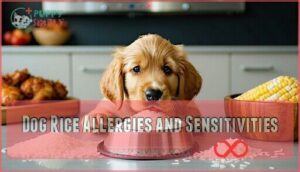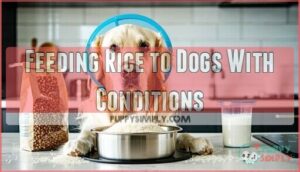This site is supported by our readers. We may earn a commission, at no cost to you, if you purchase through links.

Rice acts like a gentle friend to upset stomachs, providing easy-to-digest carbohydrates that won’t rock the boat. You’ll want to stick with plain, cooked rice – no butter, salt, or seasonings that could cause trouble.
White rice works best for sensitive tummies, while brown rice offers extra nutrients for healthy pups. Think of rice as nature’s comfort food for dogs.
It’s filling, nutritious, and safe when served in moderation. However, the type of rice you choose and how you prepare it makes all the difference.
Table Of Contents
- Key Takeaways
- Can Dogs Eat Rice
- Is Rice Safe for Dogs
- Types of Rice for Dogs
- Rice Nutrition and Health
- Preparing Rice for Dogs
- Risks of Feeding Rice to Dogs
- Benefits of Rice for Dogs
- Dog Rice Allergies and Sensitivities
- Feeding Rice to Dogs With Conditions
- Consulting a Vet for Rice Diets
- Frequently Asked Questions (FAQs)
- How much rice is OK for a dog?
- Is white rice toxic for dogs?
- What’s better for dogs, rice or pasta?
- Can dogs eat fully cooked rice?
- How much rice should I feed my dog?
- Is cooked or raw rice better for dogs?
- Is there a difference between white and brown rice for dogs?
- Are there any alternative carbohydrate sources for dogs with rice allergies?
- Is it safe to give my dog fried rice?
- Can rice replace commercial dog food completely?
- Conclusion
Key Takeaways
- You can safely feed your dog rice when it’s plain and cooked – stick to white rice for upset stomachs or brown rice for added nutrition, but never add seasonings, salt, or butter that could harm your pup.
- Keep rice portions small and infrequent – limit rice to 10% of your dog’s daily calories and serve it only 2-3 times per week, with portions ranging from 1-2 tablespoons for small dogs to ½ cup for large breeds.
- Rice works as a natural stomach soother – veterinarians often recommend plain white rice for dogs with diarrhea or digestive upset because it’s gentle, easily digestible, and helps bind loose stools.
- Watch for allergic reactions and consult your vet first – while rice allergies are uncommon, you should monitor for symptoms like itching or vomiting, and always check with your veterinarian before adding rice to dogs with diabetes or other health conditions.
Can Dogs Eat Rice
Yes, dogs can eat rice, and it’s actually one of the safest grains you can share with your furry friend.
Many pet owners wonder, "is rice safe for dogs?" The answer is a resounding yes when prepared correctly.
Rice benefits dogs by providing easily digestible carbohydrates and essential nutrients like magnesium, phosphorus, and B vitamins.
Veterinarians often recommend rice for dogs experiencing digestive upset because it’s gentle on their stomachs.
Unlike some Rice Myths suggest, rice isn’t harmful to most dogs.
However, Breed Differences may affect how well individual dogs tolerate rice.
While rice serves as an excellent base, Rice Alternatives like sweet potato or quinoa can offer variety.
Rice Toppers such as plain chicken can enhance palatability, but proper Cooking Methods matter.
Always serve rice plain and fully cooked to guarantee your dog’s safety and health.
**However, uncooked rice poses risks and should be avoided.
Is Rice Safe for Dogs
Rice toxicity isn’t a concern for most dogs when prepared correctly. Your furry friend can safely enjoy this grain as part of a balanced diet. Rice for dogs offers several benefits, including easy digestion and stomach-soothing properties. Is rice safe? Absolutely, when you follow proper preparation and portion guidelines.
Here are three key safety points to remember:
- Cook rice thoroughly – Raw rice can be difficult to digest and may cause stomach upset
- Keep portions appropriate – Rice should make up no more than 10% of your dog’s daily calories
- Skip all seasonings – Plain, unseasoned rice is the only safe option for dogs
Rice benefits dogs by providing easily digestible carbohydrates and energy. However, breed differences may affect how well individual dogs tolerate rice. Safe amounts depend on your dog’s size and health status. While rice side effects are minimal when fed properly, moderation prevents potential weight gain. Feeding dogs uncooked rice risks potential digestive issues.
Types of Rice for Dogs
You’ll find several rice varieties that work well for dogs, though each type offers different benefits and considerations for your pet’s health.
White rice works best for dogs with stomach issues, while brown rice provides more nutrients but can be harder to digest.
White Rice Benefits
Think of white rice as your dog’s comfort food during tummy troubles.
Its high starch content makes it incredibly gentle on upset stomachs, providing quick energy without overwhelming digestion.
Vets often recommend white rice for dogs for GI relief because it excels at stool binding when diarrhea strikes.
This bland diet staple offers excellent palatability, making recovery meals more appealing for finicky eaters.
It’s also worth noting that rice contains antioxidants for cognition in older dogs, which can be considered a key benefit for their overall health, making white rice a good GI relief option and a suitable recovery meal.
Brown Rice Nutrition
Unlike its white counterpart, brown rice packs a nutritional punch that’s worth considering for your furry friend.
This whole grain option delivers superior brown rice benefits through its intact bran layer, though digestibility concerns make it less suitable for sensitive stomachs.
Here’s what makes brown rice nutritionally superior:
- Higher fiber content supports healthy digestion and bowel regularity
- Enhanced mineral absorption provides essential B vitamins, vitamin E, and iron
- Superior nutritional value offers more protein and beneficial phytochemicals than white rice
Jasmine Rice Safety
Like a gentle cousin to regular white rice, jasmine rice shares similar nutritional benefits and safety profiles for dogs.
This aromatic variety has a moderate jasmine glycemic index, making it suitable for most pups.
When preparing jasmine rice for dogs, stick to plain preparation methods without seasonings.
Safe quantities follow the same 10% treat rule, though it lacks the fiber density of brown alternatives.
Basmati Rice Moderation
Basmati rice offers a fragrant alternative that’s perfectly safe for your furry friend when served properly.
This aromatic grain can settle upset stomachs just like other white rice varieties, but moderation remains your best friend.
Here are key basmati rice guidelines for dogs:
- Frequency Limits – Serve no more than 2-3 times weekly
- Portion Guidelines – Follow size-based measurements (tablespoons to half-cups)
- Balanced Diet – Keep rice under 10% of total daily calories
- Veterinary Advice – Consult your vet before introducing new foods
- Potential Risks – Monitor for weight gain and digestive changes
Cook basmati rice plain without salt, spices, or butter.
Your dog’s health depends on simple preparation and careful portion control.
Wild Rice Antioxidants
Wild rice brings something special to your dog’s bowl. This nutrient-packed grain acts as an antioxidant powerhouse, supporting bone health while delivering exceptional nutritional value.
You’ll often find wild rice in gourmet dog food formulations. Like other rice varieties, it must be cooked plain and introduced gradually to monitor your pup’s tolerance. Digestive upset is possible, so introduce rice slowly.
| Wild Rice Benefits | Details |
|---|---|
| Antioxidant Properties | Fights free radicals and supports cellular health |
| Bone Health Support | Contains minerals that strengthen skeletal system |
| Nutritional Value | Higher protein and fiber than white rice |
| Gourmet Appeal | Featured in premium commercial dog foods |
| Cooking Requirements | Must be thoroughly cooked, served plain |
Rice Nutrition and Health
Rice packs more nutritional value than you’d expect, offering your dog essential vitamins like B-complex, minerals such as magnesium and phosphorus, and clean carbohydrates for energy.
When you understand rice’s nutritional profile, you’ll see why it’s not just filler food but a legitimate source of digestible nutrients that can support your dog’s overall health.
Carbohydrate Source
Rice serves as your dog’s primary Energy Source, delivering carbs that fuel daily activities.
Rice fuels your pup’s adventures with clean, digestible energy that keeps tails wagging all day long.
Active Dogs especially benefit from this steady fuel, though the Rice Glycemic index** matters.
When considering Carb Alternatives, remember Moderation Importance – too many carbohydrates can pack on pounds and stress your pup’s system unnecessarily.
Brown rice is a better option due to its higher dietary fiber content.
Essential Vitamins and Minerals
Your dog’s bowl gets a nutritional boost when you add rice.
This grain packs over 15 vitamins and minerals, including vitamin B, magnesium, phosphorus, and iron.
Rice nutrients support your pup’s energy metabolism and blood health.
The bioavailability factors in cooked rice help with mineral absorption, making these vitamin benefits easily accessible for your dog’s system, which is important for overall energy metabolism.
Fiber and Digestion
How does fiber content affect your dog’s digestion when eating rice?
Brown rice contains more fiber, promoting regular bowel movements and supporting beneficial gut bacteria in your pet’s system.
White rice offers less fiber, making it gentler on sensitive stomachs and ideal for dogs experiencing diarrhea or other gastrointestinal issues.
Rice digestibility varies substantially between types, helping address different digestive concerns, including the impact of brown rice.
Energy and Weight Management
When managing your dog’s energy needs, rice provides carbohydrates that fuel daily activities.
However, calorie control matters—rice shouldn’t exceed 10% of their balanced diet.
Monitor portion sizes based on your dog’s activity levels, as excess carbohydrates can trigger weight gain and diabetes risk.
White rice’s high glycemic index requires careful weight monitoring to maintain your pup’s health.
Preparing Rice for Dogs
When you prepare rice for your dog, you’ll want to keep it simple and plain.
Cook the rice in water without any seasonings, spices, or additives that could upset your pet’s stomach.
Cooking Methods
Getting your pup’s rice just right doesn’t require a culinary degree. Boiling Rice in plain water works best—skip the Rice Cooker complexity for now. Avoid Baking Rice or Microwaving Rice, as these methods can create uneven textures.
Broth Cooking might sound fancy, but stick to water for rice preparation dogs can actually digest. Some owners even explore specialty rice products for their dogs.
- Use a 3:1 water-to-rice ratio for perfect consistency
- Simmer on low heat for 40-50 minutes until water absorbs
- Cool thoroughly before serving to prevent mouth burns
Portion Control
Balance becomes your best friend when serving rice to dogs.
Start with small amounts during gradual introduction, then adjust based on your pup’s size and daily calorie counting needs.
Rice should represent only 10% of their total diet as treat percentage guidelines suggest.
You can find specialized dog rice products online.
| Dog Size | Rice Portion | Frequency |
|---|---|---|
| Small (under 25 lbs) | 2-3 tablespoons | 2-3 times weekly |
| Medium (25-60 lbs) | 1/4 cup | 2-3 times weekly |
| Large (over 60 lbs) | 1/3-1/2 cup | 2-3 times weekly |
Monitor breed specifics and daily limits carefully to prevent weight gain while maintaining balanced dog food nutrition and following the total diet guidelines.
Feeding Guidelines
Smart rice frequency starts with the 10% rule—rice shouldn’t exceed this treat percentage of your dog’s daily calories.
Smart pup parents follow the golden 10% rule—rice stays a treat, not the main meal.
Serve rice 2-3 times weekly maximum, adjusting portion sizes based on your pup’s weight.
Always pair rice with quality protein to maintain a balanced diet.
Before adding rice to your dog’s regular routine, schedule a vet consultation for personalized veterinarian advice.
Avoiding Seasonings
Keep your rice preparation simple and plain for your furry friend. Dogs don’t need fancy flavors like we do, and harmful spices can actually make them sick. Skip the salt, garlic, and other toxic ingredients that might upset their stomach.
Here are three key rules for safe rice preparation:
- Cook with water only – No salt, butter, or oil needed for flavorless rice
- Avoid all spices – Even "safe herbs" like parsley should be skipped for plain preparation
- Check every ingredient – Read labels to confirm no hidden seasonings sneak in
Plain rice might seem boring to you, but your dog will love it just fine. Their taste buds work differently than ours, so they won’t miss those extra flavors. Stick to the basics and you’ll keep your pup happy and healthy.
Risks of Feeding Rice to Dogs
While rice can be a healthy addition to your dog’s diet, you’ll need to watch for potential problems that can arise from overfeeding or improper preparation.
Too much rice can lead to weight gain, nutritional imbalances, and in some cases, allergic reactions that affect your pet’s health.
Weight Gain Concerns
Despite rice’s benefits, its calorie density can pack on pounds faster than you’d expect.
Without proper portion control, your dog’s weight can spiral into obesity risks territory.
Activity levels matter too – couch potato pups need smaller servings than marathon mutts.
Balance rice with a complete dog diet, treating it as an occasional addition rather than a daily staple for effective pet weight management.
Allergic Reactions
While rice allergies in dogs aren’t common, they can catch you off guard.
Some pups develop food allergies that show up as uncomfortable symptoms you’ll want to watch for.
Here are key allergy symptoms to monitor:
- Itchy skin and excessive scratching
- Vomiting or diarrhea after meals
- Red, inflamed paws or ears
- Hair loss or skin irritation
If you notice these signs, consult your vet about limited diets for proper allergy management.
Some dogs may also experience gluten intolerance risks, necessitating dietary adjustments to ensure their well-being and proper care.
Nutritional Imbalances
While rice allergies grab attention, nutritional deficiencies pose a bigger threat.
Excessive rice creates diet imbalance since it’s mostly empty calories with limited nutrients.
Your dog’s food already contains proper nutrition, so adding rice as filler concerns veterinarians.
White rice lacks essential vitamins and minerals, potentially causing nutritional content gaps that affect your dog’s overall health and dietary balance, leading to issues that can be considered a diet imbalance.
Pancreatic Stress
Beyond nutritional gaps, rice can strain your dog’s pancreas when fed regularly.
High carbohydrate loads trigger increased insulin production, potentially overwhelming this essential organ over time.
Watch for these pancreatic stress indicators:
- Excessive thirst and urination from insulin impact
- Lethargy after rice meals showing digestive enzyme strain
- Breed sensitivity variations in smaller dogs
- Pancreas overload symptoms during bland diet shifts
Monitor rice amounts carefully—your pup’s digestive health depends on moderation.
Benefits of Rice for Dogs
When you’re looking for safe, healthy additions to your dog’s diet, rice offers several proven health benefits that veterinarians regularly recommend.
You’ll find that rice can soothe upset stomachs, provide clean energy, and support your pup’s digestive health when prepared correctly.
Easy Digestion
Your dog’s stomach will thank you for choosing rice as a gentle food option.
Rice starch breaks down easily, making it perfect for dogs with GI upset or sensitive digestive systems.
When cooking rice for a bland diet, you’re supporting healthy gut bacteria while giving your pup’s stomach a much-needed break.
Rice can aid proper canine digestion.
The simple carbohydrates digest quickly without stress, making gentle food a great option for dogs with digestive issues.
Stool Binding
When your dog’s experiencing loose stools, rice acts like nature’s binding agent.
The starch in rice helps firm up runny bowel movements by absorbing excess water in the digestive tract.
Here’s how rice helps with stool binding:
- Rice Consistency creates bulk that naturally firms loose stools
- Fiber Content adds structure to bowel movements without irritation
- Gut Microbiome benefits from rice’s gentle, easily digestible carbohydrates
- Hydration Importance is maintained while excess water gets absorbed
- Bland Diet approach soothes inflammation while binding stool
This makes rice diarrhea dogs’ go-to remedy for rice upset stomach issues.
Nutrient Rich
When you’re looking at rice nutritional value, this grain packs quite the nutritional punch for your furry friend.
Rice delivers essential vitamins and minerals that support your dog’s overall health through excellent bioavailability.
| Nutrient Category | Key Components | Benefits for Dogs |
|---|---|---|
| Vitamins | B vitamins, Vitamin D, E | Energy metabolism, bone health |
| Minerals | Magnesium, phosphorus, iron | Muscle function, oxygen transport |
| Antioxidants | Phytochemicals, selenium | Immune system support |
| Fiber Source | Complex carbohydrates | Digestive health, satiety |
Soothing GI Issues
Gentle relief comes naturally when your dog faces digestive turmoil.
Veterinarian advice often includes rice benefits for upset stomachs because it’s easier on their system than many rice alternatives.
Rice helps with these gastrointestinal problems:
- Binds loose stool during diarrhea episodes
- Soothes inflamed digestive tract lining
- Provides easy-to-digest carbohydrates for energy
- Forms part of a bland diet for symptom relief
- Reduces stomach irritation naturally
This approach provides a natural way to address digestive issues in dogs, making it a valuable recommendation from veterinarians.
Dog Rice Allergies and Sensitivities
While rice allergies in dogs aren’t common, they can happen and cause symptoms like vomiting, itchy skin, or hair loss.
If you notice these signs after feeding your dog rice, stop giving it to them and talk to your vet about doing a limited diet trial to identify the specific allergen.
Signs of Allergies
Watch out for telltale signs if your dog develops rice allergies.
You’ll notice skin irritation, red patches, and persistent scratching that won’t quit.
Digestive upset like vomiting or diarrhea often appears first.
Hair loss, inflamed paws, and recurring ear infections signal deeper issues.
Dog food allergies can sneak up gradually, so monitor these symptoms closely after introducing rice.
It is crucial to identify these signs to address the allergies promptly and provide appropriate care for your dog.
Limited Diet Trials
When your dog shows signs of rice allergies, you’ll need a systematic approach to pinpoint the culprit.
Limited diet trials help identify specific triggers through careful elimination and monitoring.
Here’s what vet supervision involves during trials:
- Trial Duration: Run elimination diets for 8-12 weeks minimum
- Food Elimination: Remove all suspected allergens, including rice completely
- Reintroduction Phase: Add one ingredient back every two weeks
- Symptom Monitoring: Track digestive issues and skin reactions daily
- Vet Supervision: Schedule regular check-ups throughout the process
Avoiding Allergens
Once you’ve identified rice as the culprit through limited diet trials, complete avoidance becomes your best friend.
Switch to hypoallergenic dog food with alternative grains like quinoa or oats.
Read labels carefully – rice lurks in unexpected places as additives, and limited ingredients diets work wonders for managing food intolerance.
Remember, even trace amounts can trigger allergy symptoms in sensitive pups.
Consulting a Veterinarian
Always reach out to your veterinarian before making dietary changes, especially if you suspect rice allergies.
Your vet can provide breed-specific guidance and create customized feeding plans for your dog’s unique needs.
- Allergy testing helps identify specific triggers through elimination diets
- Health monitoring guarantees portion adjustments don’t cause nutritional imbalances
- Veterinary advice prevents complications from improper dietary changes
Feeding Rice to Dogs With Conditions
If your dog has diabetes, gastrointestinal problems, or other health conditions, you’ll need to adjust how you feed them rice.
Puppies and senior dogs also require special consideration when adding rice to their diet, so always check with your vet first.
Diabetic Dogs
Diabetic dogs need careful glycemic control regarding rice.
White rice’s high glycemic index can spike blood sugar levels, making insulin impact management tricky.
Your vet consultation should include discussing rice alternatives and portion management strategies.
Pet dietary restrictions for dog diabetes require monitoring blood sugar levels closely.
Consider pet food diabetes formulations instead of adding rice to meals to ensure effective diabetes management.
Gastrointestinal Issues
When your dog’s stomach acts up, rice becomes your best friend.
White rice offers excellent rice benefits for gastrointestinal health, creating a bland diet that soothes irritated digestive systems.
It helps firm stool consistency during diarrhea episodes and supports healthy gut bacteria.
If your pup experiences vomiting, plain cooked rice aids digestion recovery naturally, and it is a part of a bland diet that can help with gastrointestinal health.
Senior Dogs
With advancing age, your senior dog’s nutritional needs shift dramatically.
Rice can support weight management and muscle mass maintenance when part of balanced senior dog food.
However, senior dogs often face joint health and cognitive function challenges that require specialized pet nutrition.
Always consult your senior veterinarian before adding rice, as dental care issues may affect chewing ability, which is crucial for overall health.
Puppies and Rice
Growing rapidly, puppies need specialized nutrition that differs from adult dogs.
You can introduce rice to puppies around 8-12 weeks old, but their developing digestive systems require extra caution.
Start with tiny portions—just a teaspoon for small breeds, and remember that rice shouldn’t replace quality puppy food, which provides essential nutrients for proper growth.
Watch for rice allergies and prioritize puppy nutrition over treats.
Consulting a Vet for Rice Diets
You should talk to your vet before adding rice to your dog’s regular diet, especially if your pet has health conditions like diabetes or digestive problems.
Your veterinarian can create a personalized feeding plan that guarantees rice won’t interfere with your dog’s nutritional needs or medications.
Customized Feeding Plans
Your veterinarian will create a customized rice feeding plan based on your dog’s unique needs.
They’ll consider breed specifics, activity levels, health conditions, and age considerations to establish appropriate dietary goals.
A Chihuahua’s rice portions differ vastly from a Great Dane’s requirements.
Your vet guarantees the diet supports your pet’s individual nutritional profile through proper veterinarian consultation.
Monitoring Health
Once your vet creates a customized feeding plan that includes rice, keeping tabs on your dog’s health becomes your homework.
You’ll want to watch for changes that signal whether this diet adjustment is working or if tweaks are needed.
Here’s what to monitor when dogs eat rice as part of their diet:
- Weight Monitoring – Check if your pup maintains a healthy weight since rice adds carbohydrates
- Allergy Symptoms – Watch for itching, red patches, or digestive upset that might indicate rice sensitivity
- Stool Consistency – Note whether bowel movements improve or worsen with rice in their stomach
- Energy Levels – Observe if dietary balance changes affect your dog’s daily pep and health
Adjusting Portion Sizes
When adjusting rice portion sizes for your dog’s diet, consider breed size, activity level, and age factors as key determinants.
Large, active dogs need bigger servings than small, sedentary ones.
Weight management becomes vital—reduce portions if your pup’s gaining weight.
Your vet will tailor rice serving size recommendations based on your dog’s specific dietary needs and health status.
Ensuring Balanced Nutrition
Rice shouldn’t become your dog’s main course. Your vet will help you maintain proper nutrient ratios and calorie control while incorporating rice into your canine diet.
They’ll guarantee adequate protein sources and assess supplement needs for complete pet nutrition.
Consider these dietary balance factors:
- Monitor protein-to-carbohydrate ratios in dog food
- Track daily calorie intake from all sources
- Evaluate need for vitamin supplements
- Assess diet variety across meals
- Review overall dog nutrition goals
Frequently Asked Questions (FAQs)
How much rice is OK for a dog?
Your dog should get rice as only 10% of their daily calories.
Feed small portions 2-3 times weekly max.
Size matters: give 1-2 tablespoons for tiny pups, up to ½ cup for large breeds.
Is white rice toxic for dogs?
No, white rice isn’t toxic for dogs.
It’s actually safe and often recommended by veterinarians for upset stomachs.
Just make sure it’s plain, fully cooked, and served without any seasonings or additives.
What’s better for dogs, rice or pasta?
In the case of your pup’s carb choices, rice absolutely wins this battle.
It’s gentler on their stomach, easier to digest, and won’t cause the bloating issues that pasta can bring to the table, making rice a better option.
Can dogs eat fully cooked rice?
Yes, you can safely give your dog fully cooked rice.
It’s easily digestible and often recommended by vets for upset stomachs.
Keep it plain without seasonings, and serve in small portions as an occasional treat.
How much rice should I feed my dog?
Portion control is absolutely essential when feeding rice to your pup.
Give 1-2 tablespoons for small dogs, up to ½ cup for large breeds.
Rice shouldn’t exceed 10% of their daily calories—moderation keeps tails wagging!
Is cooked or raw rice better for dogs?
Only feed your dog cooked rice, never raw. Raw rice is hard to digest and can cause stomach upset. Cook it plain without seasonings, butter, or salt for safe consumption.
Is there a difference between white and brown rice for dogs?
White versus brown rice brings different benefits to your dog’s bowl.
White rice digests easier and soothes upset stomachs, while brown rice packs more nutrients but can be harder on sensitive digestive systems.
Are there any alternative carbohydrate sources for dogs with rice allergies?
Several safe carbohydrate alternatives exist for dogs with rice allergies.
You can try sweet potatoes, regular potatoes, oats, quinoa, or barley.
Always introduce new foods gradually and consult your veterinarian first.
Is it safe to give my dog fried rice?
Like offering candy to a child when they need vegetables, fried rice tempts but harms.
Don’t give your dog fried rice—it’s loaded with oils, seasonings, and potentially toxic ingredients like garlic that’ll upset their stomach.
Can rice replace commercial dog food completely?
No, rice can’t replace commercial dog food completely.
It lacks essential nutrients your dog needs for ideal health.
Rice should only make up 10% of your pup’s diet as a treat or supplement.
Conclusion
Remember when you discovered that perfect comfort food that never let you down? That’s exactly what rice can be for your furry friend.
Now you know that dogs can eat rice safely when prepared properly. White rice soothes upset stomachs, while brown rice provides extra nutrition for healthy pups.
Just remember to serve it plain, watch portions, and consult your vet for dogs with special dietary needs. Rice truly is nature’s gentle remedy for canine digestive comfort.
- https://www.amcny.org/find_doctor/carly-fox/
- https://www.petmd.com/blogs/nutritionnuggets/jcoates/2013/july/using-diet-to-treat-diarrhea-in-dogs-30647
- https://pangovet.com/?utm_source=dogster&utm_medium=article&utm_campaign=dog_eat_drink
- http://ricepedia.org/rice-as-food/the-global-staple-rice-consumers
- https://www.medicalnewstoday.com/articles/318699


